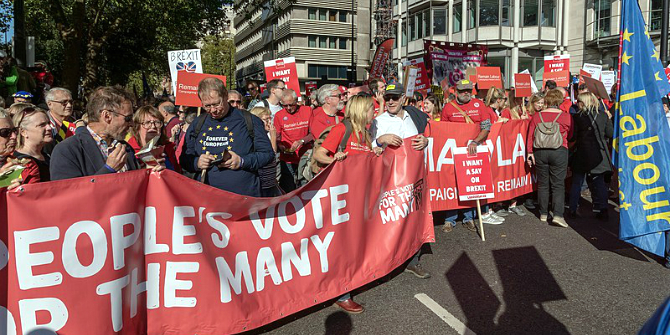
Right-wing populism is transforming the relationship between business and politics in capitalist democracies. “F*ck business” – Boris Johnson’s remark makes bluntly clear that the era when business and big banks were said to run the world is over. With the advent of Brexit and Trump, interest in populism has surged, but relatively little is known about how businesses are navigating populist politics, writes Daniel Kinderman (University of Delaware).
Right-wing populists threaten business interests in several ways. Protectionism and new trade barriers increase costs and reduce market access for many firms; restrictions on immigration reduce the supply of both unskilled and skilled workers; and the policy agenda of the populist right is often shrouded in uncertainty, which makes planning and investments difficult and risky for business.
While it is difficult to get detailed information on the political views of individual members of the business elite, business associations offer a promising path forward. These associations represent a large concentration of firms, capital, employees, and political power, and they give business its main political voice in virtually all countries. It matters what business associations say and what positions they take. The consequences of business support for right-wing populists should not be underestimated. As the examples of Brexit and Trump have shown, business opposition does not condemn populists to defeat at the polls, but business opposition can make it harder for populists to exercise political power. What does business mobilization in response to right-wing populism look like?

Fearing that the European Parliament could be taken over and paralyzed by Eurosceptics, the EU-level business association BusinessEurope campaigned for the EU in the run-up to the 2019 European Parliament elections. The French business association MEDEF played a leading role with its Merci l’Europe ! campaign, and Bernard Spitz, President of the French Insurance Federation FFA and of the European Committee at MEDEF, published a book with the same title to counter populist lies. Although this engagement did not prevent Marine Le Pen’s National Rally from getting the largest vote share in the French European Parliament elections, it is possible that these efforts helped boost voter turnout and prevented the populists from doing even better.
In Germany, the shock of Brexit and Trump was particularly deep, and it prompted one observer to ask: “Where are the top managers and entrepreneurs, the presidents of business associations and union leaders, who have strong arguments for globalization, openness and European integration? Why does hardly anyone fight for an order which forms the basis for the success of the German economy, as well as for the self-understanding of this country?” In early 2017, for the first time in their history, two German business associations overcame collective action problems and launched dedicated campaigns to defend democracy and the European and global market order against the populist right.
The machine-tool association VDMA launched #europeworks and the Business Association of Industrial Enterprises Baden WVIB in the South West of Germany launched the “Einigkeit.Recht.Freiheit.” campaign. Although these initiatives developed independently of each other, both seek to shift public opinion and mobilize employees and voters to oppose the AfD and support the EU, liberal democracy, and the European and global free market order.
In early 2017, the VDMA’s member companies demanded that the VDMA take a stand. Holger Kunze, the Director of the VDMA’s Europe office, exclaimed: “The danger that Europe will break apart is real! Brexit was the turning point or sea change, the moment when many people realized: Europe can’t be taken for granted anymore!” I queried whether a campaign like #europeworks would have been imaginable before, and Kunze replied: “absolutely not. The stress and level of suffering [Leidensdruck] was not so high back then. Now the problems had a different quality. We started deep into the abyss” (interview, 2017). “We must defend the EU against the new nationalism because it is dangerous for society and for prosperity,” stated Thilo Brodtmann, VDMA’s chief executive.
The VDMA’s strong support of the EU reflects the importance of European markets for the German machine tool industry. Both VDMA President Carl Martin Welcker and Norbert Basler, who the VDMA’s vice-president until recently, also stress the need to reduce inequality and bring those who feel ‘left behind’ back on board in order to take the wind out of the sails of populism. Basler stresses that education is the “most effective means to solve the problem in the long run” (interview, 2017) – which is precisely what some leading scholars recommend.
Just ten days after Trump’s election win, WVIB chairman Klaus Endress addressed his member companies in a speech he gave at the association’s annual general meeting. He stated that “The world has been in disorder for some time. This disorder comes – as everyone now acknowledges – from populists, their followers, and the social developments that enable populism.” As a result, he stated that “Europe is under pressure like never before” and that the “ideational foundations of the VWIB members’ economic success are in danger!” The gravity of the situation was clear: “Populism has nothing in common with our values. 2016 was bad. What will 2017, the year of the Bundestagswahl, bring?” Endress stressed the need to defend values of the Enlightenment, humanism, tolerance, and democracy.
This talk had great resonance and spurred the association into action. WVIB managing director Christoph Münzer recalls that in early 2017, “with the upcoming elections in the Netherlands and France, and with the AfD in Germany, it was a very open situation.” Endress recognized the urgency of the situation and said: “do something! let’s do something about this!” The result was the first political campaign in the history of the organization, one that sought to dissuade both members of the public and employees of WVIB companies from voting for the AfD in the run-up to the 2017 Bundestag election. “It was a huge effort for us” (interview, 2018). In Endress’s own words, “The politicians aren’t managing [die schaffen das nicht] – we’ve got to support them!” (interview, 2018).
My German business association interviewees stress the need to reform and democratise the EU in order to defend globalisation from globalisation backlash and the threat of resurgent nationalism. They also stress the plight of those who feel that they have been ‘left behind.’ At least on the face of it, segments of German business may be open to a new, more redistributive social compromise to preserve the open international economic order while preserving domestic stability – much as Ruggie described in his work on “embedded liberalism.” This resonates with recent scholarship which points to populism as a problem of “subjective social status” and provides an interesting contrast to the United States, where, as a recent book has shown, employer mobilization has often tended to be illiberal, coercive, and regressive. Economic self-interest is, of course, a powerful driver of business mobilization. I argue that the perception of vulnerability by small, export-dependent companies spurred these two German associations to engage in collective action. In contrast to large companies, these small firms do not have their own government relations people and lobbyists – they rely on associations bundle up and combine their voices.
Not in all countries do business associations respond as they did in the aforementioned French and German cases; business responses to the populist right vary across time and space. I hypothesize that business associations’ responses are shaped at least in part by the strategic context. The intensity of business opposition will be inversely related to populists’ prospects for gaining political power: where the populists are marginalized and have remote prospects for gaining political power, business associations will feel comfortable denouncing them. Quite the opposite is the case if right-wing populists have captured political power or are close to doing so. The greater the political power of the populist right, the more muted the business opposition. To draw on the metaphors Machiavelli used in The Prince, business associations will behave more like lions towards right-wing populists when the latter are politically marginalized. As right-wing populists’ political strength grows, business associations will behave more like foxes.
Overall, I expect that business associations that have the most to lose from a possible collapse of the liberal market order will be the most ardently engaged against the populist right. By contrast, in their recent book two prominent scholars argue that those benefitting from the knowledge economy support advanced capitalism and oppose populism. The empirical support for their claim is mixed. On one hand, the “Merci l’Europe” campaign was the personal idea of tech entrepreneur Geoffroy Roux de Bézieux, the newly elected president of MEDEF. On the other hand, the VDMA and WVIB campaigns can better be understood as attempts of the German export-oriented manufacturing sector to preserve the open international economic order upon which they depend.
In conclusion, the rise of the populist right has made the relationship between business and politics more complicated and conflictual than it was in the neoliberal era. One thing is sure: more research is needed on European business responses to the populist right.
This post represents the views of the author and not the Brexit blog, nor the LSE.
Daniel P Kinderman is Director of European Studies and Associate Professor at the Department of Political Science and International Relations, University of Delaware.







It’s too easy to blame “populists and their followers” for the dire straights of politics in the western world. Populists or opportunists will always be with us – their followers mainly follow because they are very dissatisfied with their lives. This could be because they are static financially while watching the 1% get extremely wealthy by the day; to a feeling that they have zero control through the political process over anything that happens in their lives. Out political systems need reform now by those politicians who still have the power and before they completely lose control to populists. Populists will not allow reform – preferring dissent and division as this is where they derive their power!
I agree that blaming “populists” is too easy. I can also understand the rage of people whose lives may be turned upside down because of Brexit. I can also understand why there is equal anger in communities who have had no investment for the past 40 years.Without a good transport system places die..No wonder such places voted for some sort of change, It is said that 3 times as much money is spent per person.in London than anywhere else.
I have read quite a few quite unpleasant posts on the LSE page. I suggest these writers should put themselves in the position of people who have lost outin the past 40 years.through no fault of their own..At least Rory Stewart whom I admire has the cleverness and compassion to understand all points of view. I Hope, against all the odds that he will become a great Prime minister and save the UK from more division..